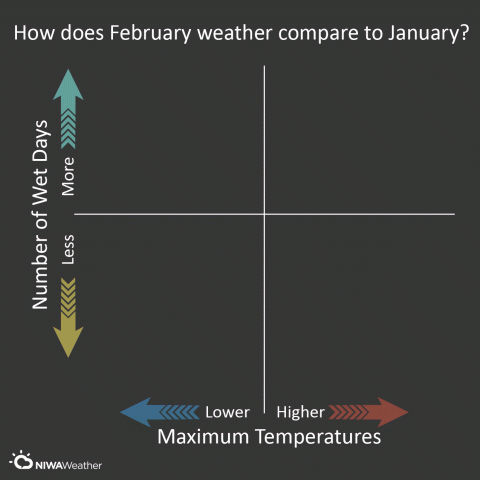Is the weather really better in February than January?
A NIWA scientist has delved into the data amid calls to change the dates of New Zealand’s traditional summer holidays after what many have said is a slow start to the 2016/17 summer.
However, climate scientist Nava Fedaeff says perceptions of summers past are clouding reality.
She has compared long-term average maximum temperatures and the number of wet days in January and February, and come up with some key facts.
“While February is generally warmer and drier for most of us, it’s not the same all over New Zealand. Gisborne and Masterton, for example, on average have wetter and cooler Februarys.
“The fact is that the average temperatures in January and February only differ by about a degree.”
In Whangarei the average maximum temperature is 24.3°C in both January and February. Aucklanders see maximum temperatures 0.6°C higher in February than January, while Timaru is 0.7°C cooler in February than January.
Last February was an exception—it was the second warmest February on record for New Zealand.
“Also, February is not immune to bad weather—there are plenty of historic examples to back this up. In 2009 ex-tropical cyclone Innis brought heavy rain, high winds and minor flooding to many parts of New Zealand. Then just a week later another storm affected almost all the North Island, and some of the South Island.”
Ms Fedaeff says normal climate variability is responsible for the summer weather, rather than any significant shift in the timing of the season.
“Sure it’s not as hot as last summer, and the sea is cooler but this is not the start of a new trend. Weather varies from year to year, as it always has. We are not seeing weather patterns change significantly, but what we have seen this summer is typical of how summers can differ over time.”
The 2011/12 summer was cold in January and February while in 1974/75, December and January were exceptionally warm while February experienced average temperatures.
This summer started with near average temperatures in December but January has seen below or much below average temperatures for many parts of the country—except in the east and north of the North Island, where Kerikeri is tracking for its 3rd warmest January on record and Hastings 2nd warmest in terms of mean maximum temperature.

Will this February be better?
“Admittedly, it is hard to do much worse,” says NIWA meteorologist Ben Noll. The start to February is expected to bring a good deal of settled and warm weather to the North Island and eastern South Island. While in general the weather will be more typical of summer, the perception may be that it is fantastic—mainly because of how poor it was for many places during the month of January. “It is important to point out that while the weather will be better for holidaymakers, severely dry weather in Hawke’s Bay, Gisborne, and Northland is not good news for farmers.”
There is some indication that a period of unsettled weather may unfold during mid-February, potentially providing beneficial rains to the North Island, Noll says.

